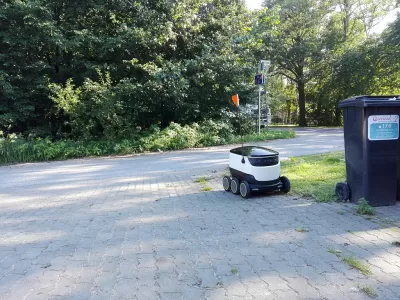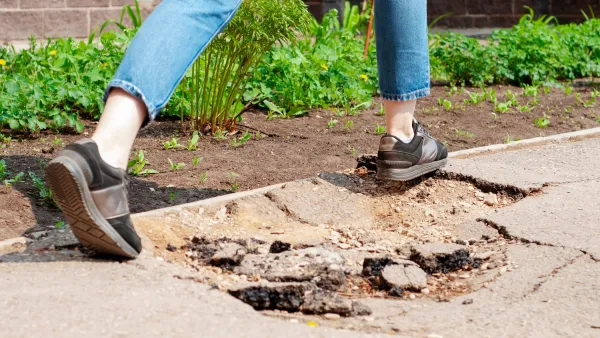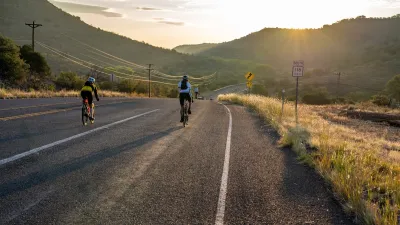Since 2017, 32 bills regulating or permitting "personal delivery devices"—sidewalk robots—have been introduced in 27 states.

In the era of two-day, same day, and even 30-minute delivery options for everything from toothpaste to wedding dresses, we tend to envision the world of increasingly rapid delivery as powered by drones that take to the air and drop orders off much the way that fictional storks deliver babies—right at your doorstep. However, chances are that—at least in the more immediate future—our deliveries are going to come to us in a more familiar way: by ground.
Often casually referred to as sidewalk robots, these “personal delivery devices” are electrically powered devices designed to deliver cargo locally. They’re equipped with automated driving technologies that allow them to operate with or without the remote support or supervision of a human. The products of companies spearheading the technology, like Starship and Amazon have devices that consist of a container on wheels that weigh in at roughly 100 pounds unloaded and roam at a pace of around one to three miles per hour. FedEx has a delivery robot as well—it’s a bit larger, heavier, and faster, rolling along at up to 10 miles per hour. Since 2017, 32 PDD bills have been introduced across 27 different states. Twenty one states have passed laws legalizing the use of at least some of these delivery robots on sidewalks.
But all these delivery robots move through the same pedestrian spaces that people do — think sidewalks, bike lanes, and crosswalks. They’ll be interacting with everything from people, dogs, people who use mobility devices, cyclists, cars, scooters, children, and more. While they may offer innovative deliveries of the future, Michael Clamann, a senior human factors engineer at the University of North Carolina’s Highway Safety Research Center who focuses on safety and federal legislation, has concerns surrounding the safety of PDDs, particularly when it comes to crash reporting and responsibility.
FULL STORY: Are Robots Coming to a Sidewalk Near You?

Maui's Vacation Rental Debate Turns Ugly
Verbal attacks, misinformation campaigns and fistfights plague a high-stakes debate to convert thousands of vacation rentals into long-term housing.

Planetizen Federal Action Tracker
A weekly monitor of how Trump’s orders and actions are impacting planners and planning in America.

San Francisco Suspends Traffic Calming Amidst Record Deaths
Citing “a challenging fiscal landscape,” the city will cease the program on the heels of 42 traffic deaths, including 24 pedestrians.

Defunct Pittsburgh Power Plant to Become Residential Tower
A decommissioned steam heat plant will be redeveloped into almost 100 affordable housing units.

Trump Prompts Restructuring of Transportation Research Board in “Unprecedented Overreach”
The TRB has eliminated more than half of its committees including those focused on climate, equity, and cities.

Amtrak Rolls Out New Orleans to Alabama “Mardi Gras” Train
The new service will operate morning and evening departures between Mobile and New Orleans.
Urban Design for Planners 1: Software Tools
This six-course series explores essential urban design concepts using open source software and equips planners with the tools they need to participate fully in the urban design process.
Planning for Universal Design
Learn the tools for implementing Universal Design in planning regulations.
Heyer Gruel & Associates PA
JM Goldson LLC
Custer County Colorado
City of Camden Redevelopment Agency
City of Astoria
Transportation Research & Education Center (TREC) at Portland State University
Jefferson Parish Government
Camden Redevelopment Agency
City of Claremont





























